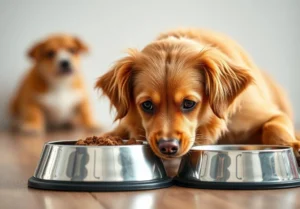
Have you ever watched your feline friend delicately select a piece from their bowl, only for them to suddenly shake their head as though they’ve tasted something foul? This peculiar behavior, far from being a sign of dislike, is actually a common yet mysterious aspect of cat behavior that many owners find both amusing and confusing. It’s not about the taste of their food, but there’s something more intriguing at play.
In this blog post, we’re diving headfirst into the whisker-twitching world of felines to uncover the reasons behind this quirky eating habit. Prepare to have your curiosity satisfied and perhaps even share a knowing nod with your kitty the next time they give their head a shake.
Quick Takeaways:
- Head shaking while eating can signal curiosity or discomfort with the food’s texture, size, or temperature.
- Persistent head shaking may hint at dental issues requiring a vet’s attention.
- Adjusting food bowl size and elevating it might enhance your cat’s eating experience and reduce head shaking.
Is It Normal for Cats to Shake Their Heads While Eating?
Absolutely, seeing your furry friend shaking its head while noshing on its meal is more common than you might think.
Cats, like humans, have their own quirks and behaviors that might seem odd at first glance but are perfectly normal. Head shaking during meals can be ascribed to a few harmless reasons. Maybe they’re just trying to get a better grip on their food, especially if it’s something a bit slippery or if it’s chunky. It could also be a reflex to dislodge any food particles from their whiskers or face. So, rest easy knowing your cat isn’t alone in doing the head-shake dance at mealtime.
What Triggers Cats to Shake Their Heads When Eating?
Cats are notorious for being finicky eaters, and sometimes the slightest change in their diet or the texture of their food can set off some quirky behaviors, like head shaking. Here are some common triggers:
- Textures that are new or unusual to them might cause confusion or curiosity, leading to head shaking.
- Tastes that don’t align with their preference. Just as some foods make us wrinkle our noses, cats might physically react to tastes they find unpalatable.
- The temperature of the food can also play a role. Cats generally prefer their food at room temperature, as too cold or too hot can be unpleasant for them.
When it comes to different types of food:
- Dry food might prompt head shaking if it’s a new brand or shape they’re not used to, or perhaps it’s just a bit dusty.
- Wet food, especially if it’s chunkier or includes pieces they’re not keen on, can lead to some head shaking as they try to eat around the undesirable bits.
It’s a fascinating little insight into the cat’s world, illustrating how even the smallest change can ripple through their behavior.
Could Dental Issues Be Behind the Head Shakes?
While occasional head shaking can be chalked up to peculiarities or preferences, consistent head shaking at meal times might hint at a more pressing issue, such as dental pain. Cats are experts at masking discomfort, but dental issues can gradually affect their eating habits.
Signs that dental problems could be causing the head shakes include:
- Difficulty eating or sudden disinterest in food, particularly if it’s their usual fare.
- Bad breath, a telltale sign of dental disease or other oral health issues.
- Pawing at the mouth or visible discomfort when eating.
Dental health is paramount for cats, as neglected issues can lead to more serious health concerns. Regular check-ups with the vet can catch early signs of dental disease, ensuring your cat remains healthy and happy.
Moreover, introducing dental care routines at home, like brushing your cat’s teeth or offering dental treats, can significantly reduce the risk of dental problems. A unique recommendation is to use dental toys specifically designed for cats, such as the Petstages Catnip Chew Mice, which not only help in cleaning their teeth but also provide an engaging activity for your cat.
In essence, observing your cat’s behavior during mealtime can give you leaps of insights into their health and preferences. Whether it’s just a quirky eating habit or a sign of a dental issue, it’s always wrapped in their unique feline mystery. Keeping a watchful eye and staying proactive about your cat’s dental health can make mealtime a pleasant experience for both you and your furry companion.
Does the Type of Food Matter?
When it comes to our feline friends and their eating habits, you might wonder if the type of grub they’re munching on plays any role in the curious case of the head shake. Well, let’s dive in. From wet and dry food to treats and those gourmet homemade meals you whip up, each category of cat food has its own texture, size, and moisture content. These factors can indeed influence whether your cat feels the need to shake their head while eating.
Wet Food
Wet food, often savored by many cats, is generally easier to eat and less likely to cause head shaking. Its soft texture conforms to their mouth more naturally. However, if your cat is shaking its head while eating wet food, it might be too cold (straight from the fridge) or, conversely, too hot.
Dry Food
Dry kibble, on the other hand, might be a bit trickier for some cats, especially if the pieces are too large or have sharp edges. This can cause discomfort or even pain, prompting the head shake.
Treats
Treats come in various shapes and sizes, and while they’re a delightful prize for your pet, they can sometimes be the culprit behind the shake. Oversized or oddly shaped treats may be difficult for your cat to chew comfortably.
Homemade Food
As for homemade meals, their shakiness factor depends largely on what you’re serving up. Small, soft pieces of cooked meat are less likely to cause issues, but adding in bones (even small ones) or chunks of hard vegetables could.
Unique Insight: Despite the type of food, one often overlooked factor is the smell. Cats have a keen sense of smell, and an unusually strong or off-smell from their food might cause them to shake their heads in an attempt to clear their nasal passages.
How to Respond If Your Cat Frequently Shakes Their Head When Eating
Seeing your cat shake their head now and then might not be a red flag, but if it becomes a frequent occurrence, it’s time to play detective. Before you start worrying or rush to the vet, take a moment to analyze the situation and your cat’s overall health. Here are some actionable steps you can take:
-
Observe the Pattern : Pay attention to when the head shaking happens. Is it with a specific type of food or during every meal? Noting down these patterns can help identify the cause.
-
Check the Food Bowl : Believe it or not, the size and depth of the food bowl can contribute to your cat’s head shaking. A too-deep bowl may cause discomfort, leading to head shaking. Opt for a shallow, wide bowl that doesn’t whisker-stress your cat.
-
Inspect for Dental Issues : Dental problems in cats, like in humans, can cause discomfort and lead to head shaking while eating. Gently check your cat’s mouth for any signs of dental issues or consult your vet for a professional inspection.
-
Consider the Food Temperature : As mentioned, excessively cold or hot food can be unpleasant for cats. Aim for room temperature food to see if it makes a difference.
-
Consult a Vet : If none of the above steps reduce the head shaking, it might be time to seek professional advice. Persistent head shaking could be a sign of underlying health issues that need addressing.
Pro Tip: Sometimes, it’s not about the food itself but how you’re serving it. An often overlooked but simple change is to slightly elevate the food bowl. This can help promote a more natural eating posture, potentially reducing head shaking, especially in older cats that might have arthritis or other mobility issues.
Remember, every cat is unique, and what works for one may not work for another. It’s all about understanding your pet and tailoring your approach to their specific needs and preferences. If ever in doubt, a vet’s guidance can help clear the air, ensuring your furry friend remains healthy and happy.
Alex, a passionate animal lover, has experience in training and understanding animal behavior. As a proud pet parent to two dogs and three cats, he founded AnimalReport.net to share insights from animal experts and expand his knowledge of the animal kingdom.





I spent over three hours reading the internet today, and I haven’t come across any more compelling articles than yours. I think it’s more than worth it. I believe that the internet would be much more helpful than it is now if all bloggers and website proprietors produced stuff as excellent as you did.